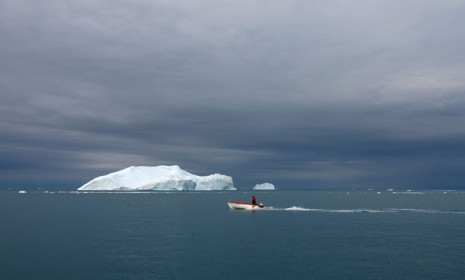Did global warming stop 16 years ago?
A British newspaper ignites a new fight over climate change with its interpretation of new temperature data released by the U.K. government

A free daily email with the biggest news stories of the day – and the best features from TheWeek.com
You are now subscribed
Your newsletter sign-up was successful
The British government's meteorological service recently released new figures on global temperatures that prompted the Daily Mail, a conservative British tabloid, to declare: "Global warming stopped 16 years ago." The bold headline rekindled the often bitter debate over climate change, and what world leaders should do about it. Have climate scientists changed their minds about what's happening to Earth's temperatures, and how pollution affects those temperatures? Here, a brief guide:
What is the big news here?
According to the Daily Mail, the U.K.'s Met Office released new data showing that there was no rise in aggregate global temperatures from the beginning of 1997 until August 2012. That, the Daily Mail reported, means that the gradual rise in the world's temperatures has hit a "plateau" or "pause" that's lasted 16 years — roughly as long as the upward climb that ran from 1980 to 1996.
The Week
Escape your echo chamber. Get the facts behind the news, plus analysis from multiple perspectives.

Sign up for The Week's Free Newsletters
From our morning news briefing to a weekly Good News Newsletter, get the best of The Week delivered directly to your inbox.
From our morning news briefing to a weekly Good News Newsletter, get the best of The Week delivered directly to your inbox.
Has global warming really stopped, then?
The scientists the Daily Mail consulted actually disagreed on just what the new figures mean. They did agree, however, that the figures cast fresh doubt on computer models that have been used to project how quickly temperatures will rise in coming decades. "The new data confirms the existence of a pause in global warming," Judith Curry, chair of the School of Earth and Atmospheric Science at Georgia Tech university, tells the Daily Mail. Maybe, says Phil Jones, a University of East Anglia professor whose leaked emails were part of the "Climategate" scandal, but "I still think that the current decade which began in 2010 will be warmer by about 0.17 degrees than the previous one."
How has this information transformed the climate-change debate?
The Met Office is "one of the official keepers of the global warming faith," says Steven Hayward at PowerLine. That makes this bombshell one of the clearest signs yet of the "collapsing soufflé of catastrophic global warming." In the U.K., it has sparked conservative criticism of the government's costly green-energy push. "Global warming is not a looming disaster," says Benny Peiser of the Global Warming Policy Foundation. "We have more time to come up with a more moderate and more realistic solution rather than just running around like headless chickens."
A free daily email with the biggest news stories of the day – and the best features from TheWeek.com
Do we really have more time?
Not necessarily. Critics say the Daily Mail simply "cherrypicked" the data. To back up its blockbuster headline, says a statement from the Met Office in response to the story, the Daily Mail chose a starting point that came in the middle of "an exceptionally strong El Niño," which came after a "double-dip La Niña." The unusual conditions in the Pacific Ocean led to a spike in temperatures. "Choosing a starting or end point on short-term scales can be very misleading" — start the comparison in August instead of January 1997, and you get a sharper temperature rise. The important thing to note, the Met Office says, is the long-term trend, and "the 1990s were warmer than the 1980s, and the 2000s were warmer than both. Eight of the top ten warmest years have occurred in the last decade," and over the last 140 years global surface temperatures have climbed by about 0.8ºC.
Sources: Daily Mail, Express, Mark Lynas (via Twitter), Met Office, PowerLine
-
 The ‘ravenous’ demand for Cornish minerals
The ‘ravenous’ demand for Cornish mineralsUnder the Radar Growing need for critical minerals to power tech has intensified ‘appetite’ for lithium, which could be a ‘huge boon’ for local economy
-
 Why are election experts taking Trump’s midterm threats seriously?
Why are election experts taking Trump’s midterm threats seriously?IN THE SPOTLIGHT As the president muses about polling place deployments and a centralized electoral system aimed at one-party control, lawmakers are taking this administration at its word
-
 ‘Restaurateurs have become millionaires’
‘Restaurateurs have become millionaires’Instant Opinion Opinion, comment and editorials of the day